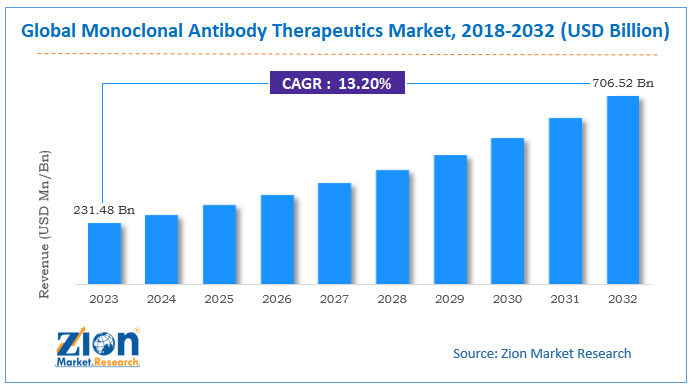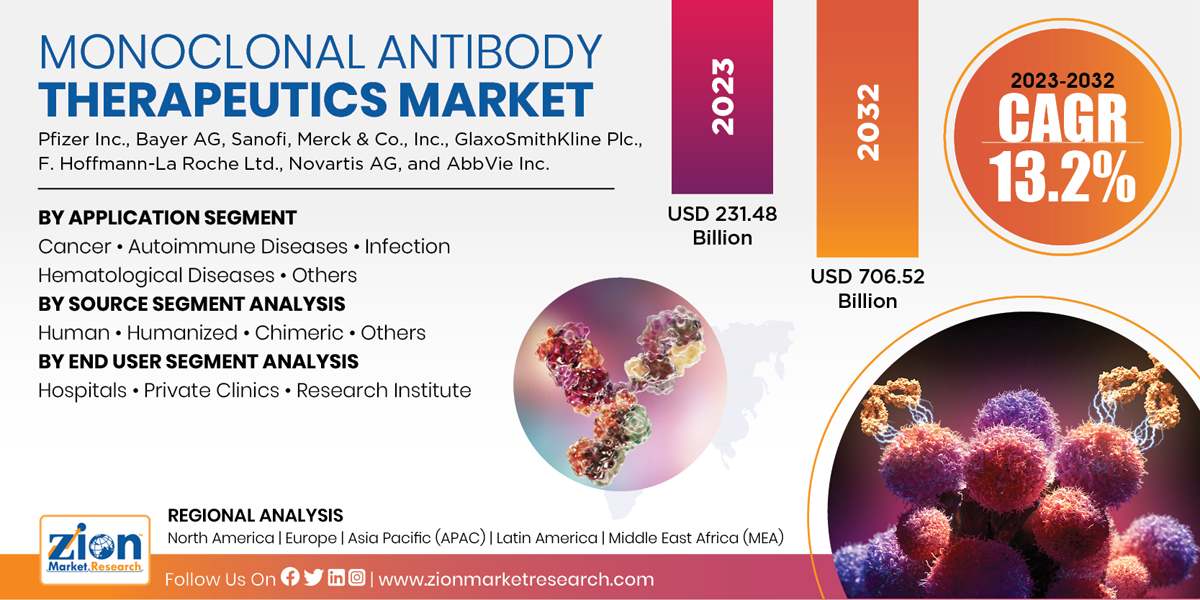Monoclonal Antibody Therapeutics Market Size, Share, Forecast, Demand, Analysis 2032

Monoclonal Antibody Therapeutics Market By Application(Cancer, Autoimmune Diseases, Infection, Hematological Diseases, Others), By Source(Human, Humanized, Chimeric, Others), By End User(Hospitals, Private Clinics, Research Institute), and By Region: Global Industry Perspective, Comprehensive Analysis and Forecast, 2024-2032
| Market Size in 2023 | Market Forecast in 2032 | CAGR (in %) | Base Year |
|---|---|---|---|
| USD 231.48 Billion | USD 706.52 Billion | 13.2% | 2023 |
The global Monoclonal Antibody Therapeutics market size accrued earnings worth approximately USD 231.48 Billion in 2023 and is predicted to gain revenue of about USD 706.52 Billion by 2032, is set to record a CAGR of nearly 13.2% over the period from 2024 to 2032.
The study includes drivers and restraints for the monoclonal antibody therapeutics market along with the impact they have on the demand over the forecast period. Additionally, the report includes the study of opportunities available in the monoclonal antibody therapeutics market on a global level.
Global Monoclonal Antibody Therapeutics Market Overview
Monoclonal antibody therapeutics is a type of therapy in which monoclonal antibodies are used to target a specific cell, which can cause various diseases. Monoclonal antibodies are the once which have identical structures as they are produced from one type of immune cell. An antibody is a protein that binds to a specific protein called antigen. They target various receptors on the cell surface and modulate their vital functions and cause cell death through various mechanism. Antibodies have two main functions namely recognize and bind to the target cell or antigen to induce immune response against the antigen. When a monoclonal antibody binds to the specific target cell it induces the immune response against the cell, which helps to decrease the effect of the disease in humans.
Global Monoclonal Antibody Therapeutics Market Growth Dynamics
Researchers have designed various monoclonal antibodies which are specific in various diseases including cancer. As there is rapid increase in the number of patients suffering from cancer, demand for global monoclonal antibody therapeutics market is expected to grow. Growing chronic diseases and increasing health concerns also act as a driver for the growth of this market. Technological advancements in the field of healthcare are also fueling the growth of the market. Use of monoclonal antibody products is approved in regions like Europe and U.S.; therefore there is increase in demand for monoclonal antibody therapeutics. However, due to introduction of biosimilars the growth of global monoclonal antibody therapeutics market is hindered. High cost of monoclonal antibody therapeutics is also expected to affect the growth of the market in the forecast period. Time-consuming procedures for production of monoclonal antibodies and strict approval procedures are also hampering the growth of the global monoclonal antibody therapeutics market.
In order to give the users of this report a comprehensive view on the monoclonal antibody therapeutics market, we have included a competitive landscape and analysis of Porter’s Five Forces model for the market. The study encompasses a market attractiveness analysis, wherein all segments are benchmarked based on their market size, growth rate and general attractiveness.
The report provides company market share analysis in order to give a broader overview of the key players in the market. In addition, the report also covers key strategic developments of the market including acquisitions & mergers, new product launch, agreements, partnerships, collaborations & joint ventures, research & development, product and regional expansion of major participants involved in the market.
Monoclonal Antibody Therapeutics Market Segmentation Analysis
The study provides a decisive view on the monoclonal antibody therapeutics market by segmenting the market based on application, source, end user and region. All the segments have been analyzed based on present and future trends and the market is estimated from 2024 to 2032.
Based on application, the market is segmented into cancer, autoimmune diseases, infection, hematological diseases, and others. Autoimmune diseases segment is expected to dominate the global monoclonal antibody therapeutics market during in the forecast period.
By source, the market is segmented into human, humanized, chimeric and others. The human monoclonal antibody segment is expected to dominate the global monoclonal antibody therapeutics market.
Based on end users, the market is segmented into hospitals, private clinics and research institutes. Research institute segment is anticipated to dominate the global monoclonal antibody therapeutics market in the future.
Global Monoclonal Antibody Therapeutics Market Report Scope:
| Report Attributes | Report Details |
|---|---|
| Report Name | Monoclonal Antibody Therapeutics Market |
| Market Size in 2017 | USD 231.48 Billion |
| Market Forecast in 2023 | USD 706.52 Billion |
| Compound Annual Growth Rate | CAGR of 13.2% |
| Number of Pages | 196 |
| Forecast Units | Value (USD Billion), and Volume (Units) |
| Key Companies Covered | Pfizer Inc., Bayer AG, Sanofi, Merck & Co., Inc., GlaxoSmithKline Plc., F. Hoffmann-La Roche Ltd., Novartis AG, and AbbVie Inc. |
| Segments Covered | By Source, By Application, By End User And By Region |
| Regions Covered | North America, Europe, Asia Pacific (APAC), Latian America, Middle East and Africa (MEA) |
| Countries Covered | North America: U.S and Canada Europe: Germany, Italy, Russia, U.K, Spain, France, Rest of Europe APAC: China, Australia, Japan, India, South Korea, South East Asia, Rest of Asia Pacific Latin America: Brazil, Argentina, Chile The Middle East And Africa: South Africa, GCC, Rest of MEA |
| Base Year | 2023 |
| Historical Year | 2018 to 2023 |
| Forecast Year | 2024 - 2032 |
| Customization Scope | Avail customized purchase options to meet your exact research needs. Request For Customization |
Monoclonal Antibody Therapeutics Market: Regional Analysis
The regional segmentation includes the current and forecast demand for North America, Europe, Asia Pacific, Latin America and Middle East & Africa with its further bifurcation into major countries including the U.S., UK, Germany, France, China, Japan, India, Brazil, etc. This segmentation includes demand for monoclonal antibody therapeutics market based on all segments in all the regions and countries.
North America is projected to continue its supremacy, in global monoclonal antibody therapeutics market, which will be followed by Europe, in the forthcoming years. The growth of this regional market is due to the increasing technological advancements in the region.
To know more about this report, request a sample copy.
The report also includes detailed profiles of end players such as
- Pfizer Inc.
- Bayer AG
- Sanofi
- Merck & Co., Inc.
- GlaxoSmithKline Plc.
- F. Hoffmann-La Roche Ltd.
- Novartis AG
- and AbbVie Inc.
This report segments the global monoclonal antibody therapeutics market as follows:
By Application Segment Analysis
- Cancer
- Autoimmune Diseases
- Infection
- Hematological Diseases
- Others
By Source Segment Analysis
- Human
- Humanized
- Chimeric
- Others
By End User Segment Analysis
- Hospitals
- Private Clinics
- Research Institute
By Regional Segment Analysis
- North America
- U.S.
- Europe
- UK
- France
- Germany
- Asia Pacific
- China
- Japan
- India
- Latin America
- Brazil
- Middle East and Africa
Table Of Content
Methodology
FrequentlyAsked Questions
Monoclonal antibodies (mAbs) are laboratory-produced proteins that mimic the immune system's ability to fight off harmful pathogens, such as viruses or cancer cells. They are designed to target specific proteins or antigens on the surface of these cells and neutralize their activity.
Global Monoclonal Antibody Therapeutics market size earned $231.48 B in 2023 and is expected to hit $706.52 B by 2032, with a projected CAGR of 13.2%.
The main drivers of growth in the monoclonal antibody therapeutics market include increasing prevalence of chronic diseases, rising demand for personalized medicine, growing investments in research and development activities, and increasing adoption of mAbs in emerging markets.
Some of the major challenges faced by the monoclonal antibody therapeutics market include high costs associated with the development and manufacturing of these drugs, stringent regulatory requirements, and the emergence of biosimilars and other competing therapies.
Some of the key players in the monoclonal antibody therapeutics market include Pfizer Inc., Bayer AG, Sanofi, Merck & Co., Inc., GlaxoSmithKline Plc., F. Hoffmann-La Roche Ltd., Novartis AG, and AbbVie Inc.
RelatedNews
HappyClients
Zion Market Research
Tel: +1 (302) 444-0166
USA/Canada Toll Free No.+1 (855) 465-4651
3rd Floor,
Mrunal Paradise, Opp Maharaja Hotel,
Pimple Gurav, Pune 411061,
Maharashtra, India
Phone No +91 7768 006 007, +91 7768 006 008
US OFFICE NO +1 (302) 444-0166
US/CAN TOLL FREE +1 (855) 465-4651
Email: sales@zionmarketresearch.com
We have secured system to process your transaction.
Our support available to help you 24 hours a day, five days a week.
Monday - Friday: 9AM - 6PM
Saturday - Sunday: Closed







